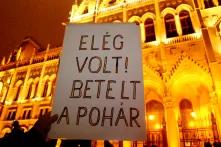
There is probably no illiberal state without a comprehensive ideology – an ideology that justifies just about anything.
The illiberal state parts ways with the liberal principles of government because, as it were, it has higher goals – the nation’s own. For the ideologists of the illiberal state, liberal democracy is an unproductive cult of dissent. They know very well that the separation of powers and the checks and balances characteristic of liberal democracies serve a purpose: to limit public power in order to safeguard freedom. They are also well aware that fair and open political competition – another tenet of the liberal ideal – serves a purpose, too: to provide space to represent all the different conceptions of the nature of the public good that are present in a society – a society in which disagreement about important matters is normal.
They understand all this, but they say it is all unnecessary and destructive. It is unnecessary because the nation has its own character, a well-defined set of values and moral goals, its own conception of the truth and the good life. Yes, there are some individuals who disagree, but they are alien to the nation’s true nature. The nation knows what it wants. The liberal ideal is destructive, they say, because the limitations it imposes on public power would only limit the government’s potential to live up to, and to cater to, the values and moral objectives of the nation – assuming, of course, that the government was formed by nation’s true political representatives. It is all the better if the rules of political competition are bent to ensure that the government remains in power indefinitely. After all, the ultimate moral purpose of the political institutions is that the concept of the public good which is endorsed by the nation’s true spirit should prevail.
Power in the hands of chosen oligarchs
Why should the economy be an exception? The level playing field of the marketplace - yet another aspect of the liberal ideal - is just one more obstacle to be pushed aside to make way for true national politics. The distribution of wealth and economic power is not a matter that can be left to the dumb inanimate powers of the marketplace that know no meaning or purpose. If the goal is to enable the nation’s true will to overcome the cacophony of liberal pluralism, then economic power should be in the hands of those who are willing to use it to promote this goal. It is the nature of the illiberal state that it should seek to concentrate economic power in the hands of its chosen oligarchs who are loyal to the political goals of the ruling party.
In a country like Hungary, where the corrupt interplay between politics and economics was a depressing reality even before 2010, this requires a guard change among oligarchs. Those who are not loyal to the current government must fall, and should be replaced by new oligarchs. This is a very costly operation which affects an enormous amount of resources.
There are constraints on this programme, however, especially if the government of the illiberal state wishes to maintain a façade of the rule of law, as Prime Minister Orbán’s regime does. The funds that are easiest to mobilise to establish the illiberal new deal are those received from the European Union. The EU’s cohesion policy accounts for 3 percent to 3.5 percent of Hungary’s annual GDP, on average. This is approximately equivalent to the country’s growth rate last year, and is on the same order of magnitude as spending on education, for example. It is an enormous injection of capital, and this money is used methodically to develop the new oligarchy of the Orbán regime.
A monument to broken friedship
In her recently published memoir, former US Ambassador Eleni Kounalakis reports that the former Hungarian National Development Minister told her openly that she (the minister) and Orbán personally selected the winners of the larger public procurement tenders. Two weeks ago, Orbán was interviewed about it and he confirmed that this is indeed the procedure—which he considers normal; the only change is the person of the development minister.
For the sake of simplicity, in the previous term (2010-2014) the development minister and a good portion of the ministry’s senior staff (along with many other important officials, including the head of the tax authority who is involved in the US visa ban scandal) were chosen by Fidesz’s former top oligarch, Orbán’s college friend, Lajos Simicska. Once Fidesz’s treasurer, and the head of the tax authority in 1998 -1999 during the first Orbán government, Simicska was probably the main beneficiary of the EU’s cohesion policy until recently, mostly through his flagship company, Közgép, which was the perennial winner of major building tenders.
Simicska’s relationship with Orbán was that of a strong and influential oligarch with great economic might who sponsors the ruling party and influences government policy, and an autocratic leader who runs the political show and ensures the oligarch’s revenues. Occasionally, Simicska’s growing direct influence on government departments was mentioned in leaks from Fidesz circles as a potential source of friction between the two old friends, and eventually such speculation came to fruition with a spectacular falling-out in February 2015. Simicska’s company is now the protagonist in the scandal surrounding the construction of the M4 motorway - another shamelessly overpriced public procurement project it won - which the government recently suspended. The motorway’s torso is now a huge monument to a broken friendship, and Közgép has not won a single public procurement tender since February.
EU-funded empires
In the wake of this breakup, the dominant new trend in the illiberal Hungarian state is that strong, influential and potentially independent oligarchs are no longer desirable. They are being replaced with new ones who are much closer to the prime minister and who behave much more like straw men than independent actors. Two illustrative examples are the mayor of Orbán’s native village and the prime minister’s very own son-in-law. The mayor, Lőrinc Mészáros, a former gas-fitter and a successful local entrepreneur even before 2010, rose to national prominence under the previous term of the Orbán government when his construction business experienced tenfold growth between 2010 and 2013. Mészáros is also active in the agribusiness sector, and became one of the top 100 richest Hungarians this year. István Tiborcz, the PM’s son-in-law, founded an energy company in 2009 which for a time was partially owned by Simicska, and which rose to prominence by winning a large number of outdoor lighting procurement tenders from municipal administrations.
The common elements linking the old college buddy, the village mayor and the son-in-law are that the primary source of their companies’ income is public money, and that these companies were developed - in large part also with public money - in order to be able to win public contracts. EU funds are a major source of this public money. Investigative journalism blog Direkt36 has calculated the share of EU funds in the nearly 300 state contracts that the companies of these three men won between 2010 and 2014, either alone or in consortia. This share is 88 percent in case of the Simicska empire, more than 94 percent in the case of the Mészáros companies, and 99 percent in Tiborcz’s case.
Another common element is that in a good number of instances the mayor and the son-in-law won tenders without competition, thanks to the creativity of those responsible for drafting the tenders in fending off potential competitors.
That’s the way it goes. To sum up, corruption is by necessity at the heart of the illiberal state, and in the case of Hungary it is funded to a large extent by European taxpayers.


